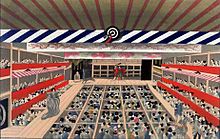kabuki
See also: Kabuki
English
Alternative forms
Etymology
Borrowing from Japanese 歌舞伎 (kabuki).
Pronunciation
- Lua error in Module:parameters at line 290: Parameter 1 should be a valid language or etymology language code; the value "UK" is not valid. See WT:LOL and WT:LOL/E. IPA(key): /kəˈbuːki/
Audio (US): (file) Audio (AU): (file) - Hyphenation: ka‧bu‧ki
- Rhymes: -uːki
Noun
kabuki (uncountable) (often capitalized)
- A form of Japanese theatre in which elaborately costumed male performers use stylized movements, dances, and songs in order to enact tragedies and comedies.
Derived terms
Translations
form of Japanese theatre
|
Anagrams
Indonesian
Etymology
Pronunciation
Noun
kabuki (first-person possessive kabukiku, second-person possessive kabukimu, third-person possessive kabukinya)
Further reading
- “kabuki” in Kamus Besar Bahasa Indonesia, Jakarta: Agency for Language Development and Cultivation – Ministry of Education, Culture, Research, and Technology of the Republic of Indonesia, 2016.
Japanese
Romanization
kabuki
Portuguese
Alternative forms
Etymology
Borrowing from Japanese 歌舞伎 (kabuki).
Noun
kabuki m (uncountable)
- kabuki (form of Japanese theatre)
Spanish
Etymology
Borrowing from Japanese 歌舞伎 (kabuki).
Noun
kabuki m (plural kabukis)
Adjective
Lua error in Module:es-headword at line 49: Parameter 1 is not used by this template.
- Relating to kabuki
Categories:
- English terms borrowed from Japanese
- English terms derived from Japanese
- English 3-syllable words
- English terms with IPA pronunciation
- English terms with audio links
- Rhymes:English/uːki
- English lemmas
- English nouns
- English uncountable nouns
- en:Japan
- en:Theater
- Indonesian terms borrowed from Japanese
- Indonesian terms derived from Japanese
- Indonesian 3-syllable words
- Indonesian terms with IPA pronunciation
- Indonesian lemmas
- Indonesian nouns
- Requests for plural forms in Indonesian entries
- id:Art
- id:Drama
- Japanese non-lemma forms
- Japanese romanizations
- Portuguese terms borrowed from Japanese
- Portuguese terms derived from Japanese
- Portuguese lemmas
- Portuguese nouns
- Portuguese uncountable nouns
- Portuguese terms spelled with K
- Portuguese masculine nouns
- Spanish terms borrowed from Japanese
- Spanish terms derived from Japanese
- Spanish lemmas
- Spanish nouns
- Spanish countable nouns
- Spanish terms spelled with K
- Spanish masculine nouns
- Spanish 3-syllable words

